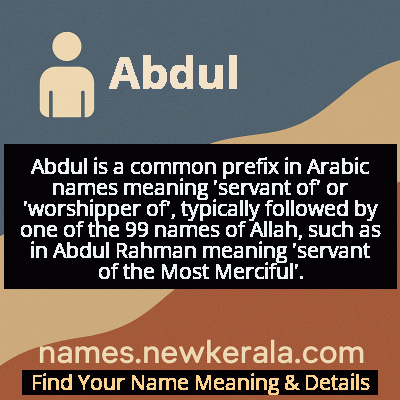Abdul Name Meaning & Details
Origin, Popularity, Numerology Analysis & Name Meaning of Abdul
Discover the origin, meaning, and cultural significance of the name ABDUL. Delve into its historical roots and explore the lasting impact it has had on communities and traditions.
Name
Abdul
Gender
Male
Origin
Muslim
Lucky Number
4
Meaning of the Name - Abdul
Abdul is a common prefix in Arabic names meaning 'servant of' or 'worshipper of', typically followed by one of the 99 names of Allah, such as in Abdul Rahman meaning 'servant of the Most Merciful'.
Abdul - Complete Numerology Analysis
Your Numerology Number
Based on Pythagorean Numerology System
Ruling Planet
Uranus (Rahu)
Positive Nature
Strong sense of order, loyal, practical, and disciplined.
Negative Traits
Stubborn, overly serious, rigid, and prone to feeling restricted.
Lucky Colours
Blue, gray.
Lucky Days
Saturday.
Lucky Stones
Blue sapphire.
Harmony Numbers
1, 7, 8.
Best Suited Professions
Managers, engineers, accountants, organizers.
What People Like About You
Dependability, discipline, practicality.
Famous People Named Abdul
Abdul Kalam
Scientist and President
11th President of India and key figure in India's space and missile programs
Abdul Sattar Edhi
Humanitarian and Philanthropist
Founded Edhi Foundation, world's largest volunteer ambulance network in Pakistan
Abdul-Jabbar
Basketball Player
NBA's all-time leading scorer and 6-time MVP, considered one of greatest basketball players
Abdul Qadeer Khan
Nuclear Scientist
Key figure in Pakistan's nuclear weapons program
Name Variations & International Equivalents
Click on blue names to explore their detailed meanings. Gray names with will be available soon.
Cultural & Historical Significance
The name embodies the Islamic concept of 'ubudiyyah' (servitude) which is considered the highest station a human can achieve in their relationship with God. Throughout Islamic history, many scholars, rulers, and saints have borne names beginning with Abdul, emphasizing their devotion and submission to divine will. The cultural significance extends beyond religious contexts into social structures, where the name often indicates family religious commitment and cultural identity. In many Muslim societies, naming a child Abdul represents parents' aspirations for their child to lead a God-conscious life filled with purpose and service.
Extended Personality Analysis
Individuals named Abdul are often perceived as having strong spiritual foundations and a deep sense of purpose. They typically exhibit qualities of humility, responsibility, and devotion, reflecting the name's meaning of servitude to God. Many Abduls demonstrate leadership qualities combined with a service-oriented mindset, often putting others' needs before their own. They tend to be reliable, trustworthy, and principled individuals who value family and community ties.
The name's religious connotations often translate into personal characteristics such as patience, perseverance, and a strong moral compass. However, like all individuals, personality traits vary widely based on upbringing, environment, and personal experiences. Some may interpret the 'servant' aspect as developing strong service-oriented careers in education, healthcare, or community leadership, while others might express their devotion through artistic or intellectual pursuits. Many Abduls are known for their calm demeanor and ability to handle challenges with grace, often serving as pillars of strength in their communities.
Modern Usage & Popularity
In contemporary times, Abdul remains a popular name across the Muslim world and among Muslim communities globally. While maintaining its traditional religious significance, the name has also become more integrated into multicultural societies. In Western countries, Abdul has seen steady usage among Muslim populations, though sometimes in combination with other names (like Abdul-Rahman) to form complete meanings. The name's popularity varies by region - it's particularly common in South Asia, the Middle East, and Africa. Modern Abduls can be found in every profession from technology and medicine to arts and sports, demonstrating the name's adaptability while maintaining its cultural roots. Recent decades have seen the name maintain consistent popularity without significant spikes or declines, reflecting its enduring appeal as a traditional yet timeless choice that bridges cultural heritage with modern identity.
Symbolic & Spiritual Meanings
Symbolically, Abdul represents the human relationship with the divine, embodying concepts of humility, service, and spiritual connection. The name serves as a constant reminder that true strength comes from submission to higher principles rather than worldly power. Metaphorically, it represents the ideal of being a 'servant' or 'steward' - someone who cares for others and fulfills responsibilities with devotion. In Islamic spirituality, the concept of being God's servant is considered the highest honor, representing complete trust and reliance on divine guidance. The name also symbolizes the bridge between human limitations and divine perfection, encouraging individuals to strive for excellence while remaining grounded in humility. In a broader sense, Abdul represents the universal human quest for meaning and purpose through service to something greater than oneself, making it a name that transcends religious boundaries to speak to fundamental human values.

